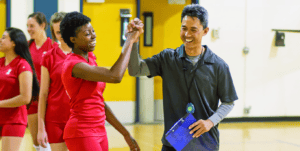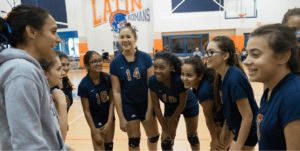PCA Resource zone
How Coaches Can Build Safe, Trusting Relationships

Building safe, trusting relationships with and amongst your athletes is the foundation for creating a Positive Youth Sports Culture. These relationships have many benefits, including helping athletes…
- Make friends more easily
- Collaborate more effectively
- Perform at a higher level
- Experience improved mental health
- Feel safer
- Take on challenges without fear of failure
- Engage more fully in learning
- Increase their effort
To create these safe and trusting relationships with their athletes, coaches can:
Learn names quickly – ask athlete their preferred name and call them by that name
Get to know each athlete as an individual – be curious, ask open ended questions, and reflect on any personal biases that may be affecting your interactions
Use informal pre- and post-practice time to connect – move around the space to connect with all athletes
Reflect on your own assumptions when evaluating athletes skills and areas for growth. Focus on behavior, technical skills, and process, versus the person.
Create empathetic connections by listening to understand your players’ experiences
Give specific, positive, and information-based feedback – research shows that the amount, type, content, and tone of coach feedback can alter how athletes will perform and develop, both physically and mentally
Be clear and concise with instructions – be aware of how your tone of voice impacts athletes, and when making corrections be sure to praise the athlete when you see improvement
Set clear, collaborative group expectations about how athletes treat themselves, each other, coaches, opponents, and referees
React quickly to prevent put-downs, bullying, or cliques
Observe constantly and notice if any athletes are being excluded. Be proactive and create ways to include anyone feeling left out.
Play with them, laugh and smile. Show athletes that you want to be there.
To forge connections amongst teammates, coaches can:
Begin a season, or a training session with an activity that encourages interaction, finding common ground, and inclusion
Run team building activities that promote collaboration, communication, and trust
Utilize personal check-ins so your athletes know how their teammates are doing. For example, during the opening of practice ask your athletes to show a thumb up, sideways, or down to share how they are doing that day.
Use a Buddy System by pairing up athletes, or by creating smaller groups. These buddies can provide support and encouragement.
Include relationship questions in your debriefing of a practice or game. For example, you could ask “Who saw a teammate trying hard?” Or “Who saw someone else improve today?”
Teach players how to give positive and information-based feedback to each other by ensuring they identify the specific skill and recognize growth and effort
Use positive team rituals to build camaraderie and team unity
Know when to get out of the way and let athletes play with each other
Versión en español: Cómo Los Coaches Pueden Construir Relaciones Seguras Y De Confianza







